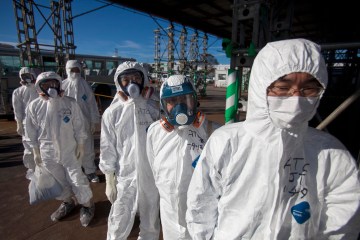Masataka Shimizu, center left, resigned as president of the power company Tepco after last year’s nuclear power disaster.
TOKYO – Nearly a year after one of the worst man-made disasters in history, Japan has decided who’s to blame: no one. Even as government and private reports reveal the full extent of the Fukushima nuclear power disaster — and the decades of falsified safety records, unheeded warnings and industry incompetence that preceded it – there has been little attempt to hold companies or individuals accountable.
No one has been arrested, charged or indicted. No criminal investigations are underway. No class-action lawsuits have been filed. The only person to lose his job has been the president of the company that owns the Fukushima No. 1 power plant, Tokyo Electric Power Co., also known as Tepco. Stephen Hesse, a professor of environmental law at Tokyo’s Chuo University, says the nature of Japanese society makes it unlikely that anyone involved will ever face criminal or civil charges.
“I would like to see somebody at least brought up on charges. I would like to see a class-action lawsuit,” says Hesse. “But there’s a great sense of fatalism and passivity and acceptance when it comes to this kind of problem in Japan. People are not going to demand their legal rights to hold others accountable – legal rights that they don’t even know they have.”
The March 11, 2011, disaster left 80,000 people permanently homeless; exposed hundreds, if not thousands, to potentially deadly radiation; and polluted vast stretches of farmland and ocean. Tepco has asked for $130 billion in taxpayer money to pay compensation claims, and tens of billions more will be needed to clean up the environmental damage.
Only now are the true causes of the disaster emerging.
A non-government panel reported last week that years of systemic negligence by Tepco and shoddy oversight by the government were directly responsible for the meltdown at one of the Fukushima reactors. The report concludes that the disaster was entirely preventable — not an inevitable result of the March 11 earthquake and tsunami, as Tepco has argued.

Reuters
Among the panel’s specific findings: Tepco “used to make light of the culture of nuclear safety” and disaster preparedness plans were “‘make-believe’ arrangements to reassure local residents.” At one point in the crisis, Tepco wanted to abandon the plant, and government leaders were perilously close to ordering the evacuation of Tokyo’s 25 million residents – with unimaginable consequences.
Even so, the report’s authors were reluctant to place individual blame or press for civil or criminal action.
“I feel personally (that someone should go to jail),” says Yoichi Funabashi, chief of the private foundation that sponsored the report. “But we are not designed to blame somebody and we are not going to delve into the legal aspect of the accident.”
Even Prime Minister Yoshihiko Noda suggested that, well, bygones should bygones.
“Rather than blaming any individual person I believe everyone has to share the pain of responsibility and learn this lesson,” said Noda, who took office after the crisis.
Principals in other world disasters have been less fortunate. Six defendants in the 1986 Chernobyl nuclear disaster received prison sentences of two to 10 years. The operator of the Three Mile Island nuclear power plant was charged with 11 felony counts for allegedly falsifying safety records and other documents prior to the 1979 accident.
The US Justice Department is continuing a criminal investigation against BP for the 2010 oil spill in the Gulf of Mexico. The company agreed this week to pay $7.8 billion to settle private plaintiffs’ claims, and could face as much as $17 billion in civil pollution fines and billions more in criminal penalties.
Kyle Cleveland, associate professor of sociology at Temple University Japan, in Tokyo, says that while Tepco and individuals may escape criminal or civil charges, they could suffer irreparable harm to their reputations – a vastly more damaging consequence in Japan’s group-driven, harmony-seeking society than in the West.
In part to publicly atone for the disaster, Tepco workers and board members have taken cuts in pay and bonuses. The company’s chairman says he will forego his retirement allowance. The government is expected to ask for, and get, the resignations of Tepco’s entire board in exchange for support payments later.
That may seem like minimal punishment , but Cleveland says it’s an important first step.
“In some ways, Japan is still not a very modernized, international society. You don’t have an oppositional press. You don’t have an activist civil society. And that means the government gets a free pass on these kinds of issues,” says Cleveland.
“But in their own way the Japanese are dealing with this. People are starting to be held accountable in the court of public opinion.”
Whether that’s enough to satisfy the thousands who have suffered harm, or to deter the next nuclear disaster in Japan — the jury is still out.


